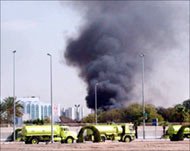UN adds two Saudis to al-Qaida list
UN Security Council members have agreed to impose sanctions on a British-based Saudi dissident and a Saudi businessman after a request by Saudi Arabia, the United States and Britain.

None of the 15 council members raised objections to the submission by the three countries before a deadline on Thursday, said Maria Isabel Seguel, spokeswoman for Chilean Ambassador Heraldo Munoz, who heads the panel supervising the sanctions.
The council committee maintains a list of persons allegedly associated with the al-Qaida network and Afghanistan’s ousted Taliban rulers.
It was established in 1999 under resolution 1267 and strengthened after the 11 September 2001 attacks against the US.
Under the resolution, all 191 UN member nations are obliged to freeze assets of those on the list, block their travel and prevent the sale of arms and military equipment to them.
Al-Qaida links?
One name submitted is Saad al-Faqih, a leading Saudi dissident who heads the London-based Movement for Islamic Reform in Arabia, which says it seeks to topple the Saudi monarchy by peaceful means.
|
“I have had no contact Saad al-Faqih, |
Saudi officials accuse al-Faqih of exploiting social and economic discontent to further a radical Islamic cause, hiding his agenda behind calls for rights and greater accountability.
In Washington, the US Treasury on Tuesday accused al-Faqih of associations with al-Qaida since the mid-1990s, including an individual linked to the bombings of US embassies in Kenya and Tanzania in 1998.
It said al-Faqih had contact with al-Qaida leader Usama bin Ladin and Khalid al-Fawwaz, whom it called bin Ladin’s de facto representative in Britain.
Al-Faqih has denied the accusations.
Connections denied
“I have had no contact or relationship with al-Qaida … and I challenge any authority to show any real substantive relationship with al-Qaida,” al-Faqih said.
 |
|
Saudi rulers have made offers |
“Due to the pressure we have caused [by the demonstrations] and the danger we have caused for the Saudi regime, it is in the interest of the current US administration to save or rescue the royal family,” he said earlier in the week.
Asked about his relationship with al-Fawwaz, al-Faqih said: “Fawwaz has been in jail since 1998. He was in London and we are from the same tribe and the same family, so we knew each other as citizens, no more than that.”
The second name submitted is Saudi businessman Adil Abd al-Jalil Battarji, who allegedly was instrumental in founding the Benevolence International Foundation, an Islamic charity that the United States has deemed a “global terrorist group”.
The US Treasury said Battarji had ranked as “one of the world’s foremost terrorist financiers, who employed his private wealth and a network of charitable fronts to bankroll the murderous agenda of al-Qaida”.
Political violence
 |
|
The past year has seen a number |
Al-Battarji has so far not reacted to the allegations.
Saudi Arabia has recently been wracked by political violence and internal dissent.
Opponents of the ruling House of Saud say it is dictatorial, corrupt and beholden to the US for its survival.
They say the US is desperate to ensure the House of Saud’s survival to protect the cheap flow of oil from the world’s largest producer.
On the other hand, the Saudi government accuses its opponents of “terrorism” and the desire to provoke instability in the country.